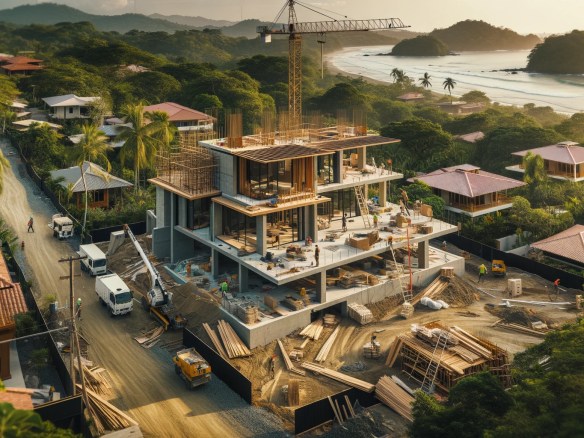What are Zoning Laws?
Zoning laws are regulations that dictate how land in a specific area can be used and developed. These laws divide regions into different zones, such as residential, commercial, industrial, and recreational, to ensure orderly and sustainable growth. By designating specific allowable land uses and building requirements for each zone, zoning laws aim to promote public health, safety, and general welfare within a community.
Zoning laws also serve to protect property values by preventing incompatible land uses from being located next to each other. These regulations help create cohesive neighborhoods and commercial areas by establishing guidelines for building height, setbacks, lot sizes, and parking requirements. Overall, zoning laws play a crucial role in shaping the physical environment of a city or town and influencing the overall quality of life for its residents.
• Zoning laws dictate land use and development regulations
• Divides regions into different zones (residential, commercial, industrial, recreational)
• Promote public health, safety, and general welfare within a community
• Protect property values by preventing incompatible land uses from being located next to each other
• Create cohesive neighborhoods and commercial areas by establishing building guidelines
Different Types of Zoning
Zoning laws classify land uses into different categories to regulate the built environment and control the type of development in specific areas. Residential zoning designates land for housing purposes, ensuring that neighborhoods are primarily used for homes and may include restrictions on building height and density. Commercial zoning permits businesses to operate in designated areas, allowing for the development of shopping centers, office buildings, and other commercial structures.
Industrial zoning is intended for manufacturing and industrial operations, separating them from residential and commercial areas due to potential noise, pollution, and safety concerns. This type of zoning is crucial for balancing the need for industrial activities with the protection of residential and commercial spaces, fostering a harmonious coexistence between different land uses.
• Residential zoning designates land for housing purposes
• Commercial zoning permits businesses to operate in designated areas
• Industrial zoning separates manufacturing and industrial operations from residential and commercial areas
• Industrial zoning is crucial for balancing the need for industrial activities with the protection of residential and commercial spaces
Zoning Regulations in Costa Rica
Costa Rica, like many other countries, has its own set of zoning regulations in place to govern land use and development within its borders. These regulations are designed to ensure orderly growth, protect the environment, and promote the overall well-being of the communities. In Costa Rica, zoning regulations dictate where certain types of developments can be built, such as residential, commercial, industrial, or agricultural, in order to maintain a balance between urbanization and conservation efforts.
Zoning regulations in Costa Rica are typically administered at the municipal level, where local government officials are responsible for enforcing and overseeing compliance with the established zoning laws. Each municipality in Costa Rica has its own zoning plan that outlines specific regulations and restrictions for different zones within its jurisdiction. These regulations are crucial for guiding real estate development, preserving natural resources, and maintaining the quality of life for residents.
• Zoning regulations in Costa Rica aim to ensure orderly growth and protect the environment
• Regulations dictate where residential, commercial, industrial, or agricultural developments can be built
• Administered at the municipal level with each municipality having its own zoning plan
• Local government officials enforce and oversee compliance with zoning laws
• Crucial for guiding real estate development and maintaining quality of life for residents

How Zoning Laws Impact Real Estate Development
Zoning laws play a crucial role in shaping the development of real estate projects. These laws dictate how land can be used in specific areas, determining where residential, commercial, and industrial developments can be located. By designating zones for different purposes, zoning laws help maintain order and organization within a community, ensuring that incompatible land uses are separated.
Moreover, zoning laws also impact property values and investment opportunities in real estate. Properties located in areas with strict zoning regulations may have limited development potential, which can affect their market value. Conversely, properties in areas with flexible zoning laws that allow for mixed-use developments or higher density construction may experience increased demand and higher property values. Understanding the zoning regulations in place is essential for real estate developers to make informed decisions and maximize the potential of their investments.
• Zoning laws dictate land use in specific areas
• Separate residential, commercial, and industrial developments
• Maintain order and organization within a community
• Zoning laws impact property values and investment opportunities
• Properties in areas with strict zoning regulations may have limited development potential
• Properties in areas with flexible zoning laws may experience increased demand and higher property values
Understanding the zoning regulations is essential for real estate developers
to make informed decisions and maximize the potential of their investments.
Zoning Permits and Approvals
When it comes to real estate development projects, obtaining the necessary zoning permits and approvals is a critical step in the process. These permits are issued by local government authorities to ensure that a proposed development complies with the zoning regulations in place for that particular area. Without the required permits and approvals, a project may face delays, fines, or even be forced to halt construction altogether.
Developers must carefully review the specific zoning regulations that apply to their project and submit a thorough application for permits and approvals. This process typically involves submitting detailed plans and documentation, attending public hearings, and working closely with zoning officials to address any concerns or modifications that may be required. By obtaining the proper permits and approvals in a timely manner, developers can proceed with their projects with the confidence that they are in compliance with zoning laws and regulations.
• Zoning permits and approvals are crucial for real estate development projects
• Issued by local government authorities to ensure compliance with zoning regulations
• Without permits, projects may face delays, fines, or construction halts
• Developers must review specific zoning regulations and submit thorough applications
• Process involves detailed plans, public hearings, and working closely with officials.
Zoning Restrictions and Limitations
Zoning restrictions are rules put in place by local governments to control the use of land in specific areas. These rules determine what type of structures can be built, how land can be utilized, and what activities are permitted within designated zones. These restrictions are essential for maintaining order, protecting property values, and ensuring that neighborhoods are developed in a cohesive and organized manner.
Limitations imposed by zoning regulations typically outline the maximum height of buildings, the minimum lot size required for construction, and the distance structures must be set back from property lines. These limitations serve the purpose of preventing overcrowding, preserving natural resources, and safeguarding the aesthetic appeal of an area. By adhering to zoning restrictions and limitations, developers and property owners can contribute to creating sustainable and harmonious communities.
• Zoning restrictions control land use in specific areas
• Determine what structures can be built and activities permitted
• Essential for maintaining order and protecting property values
• Limitations include maximum building height and minimum lot size requirements
• Setback distances from property lines are outlined to prevent overcrowding
• Preserves natural resources and safeguards aesthetic appeal of an area

Zoning Changes and Variances
Zoning changes can occur when there is a need to modify the existing regulations to accommodate new developments or land use patterns. These changes are typically initiated through a formal application process, which may require public hearings and approval by the local zoning board or governing body. Variances, on the other hand, are exceptions to the zoning regulations granted on a case-by-case basis when strict application of the rules would result in undue hardship for a property owner.
When seeking a zoning change or variance, it is crucial to provide detailed justification and documentation to support the request. This may include evidence of how the proposed change aligns with the community’s long-term planning goals or how the variance meets the legal requirements for approval. Understanding the specific procedures and criteria for zoning changes and variances in a particular jurisdiction is essential for a successful application process.
• Zoning changes are initiated through a formal application process
• Variances are exceptions granted on a case-by-case basis
• Detailed justification and documentation are crucial when seeking a zoning change or variance
• Evidence of alignment with community planning goals may be required
• Understanding specific procedures and criteria is essential for success in the application process
Zoning Violations and Penalties
Zoning violations occur when a property owner or developer fails to comply with the established zoning regulations. These violations can range from constructing a building in a prohibited zone to operating a business that does not align with the zoning requirements. When violations are identified, local zoning authorities may issue penalties or citations to address the non-compliance.
Penalties for zoning violations can vary depending on the severity of the offense and the specific regulations that were violated. In some cases, property owners may be required to cease the non-compliant activity, remove unauthorized structures, or pay fines. Repeat offenders or those who fail to rectify violations may face more serious consequences, such as legal action or even property seizure. It is crucial for property owners and developers to ensure compliance with zoning laws to avoid penalties and maintain harmonious relationships with the local community.
• Zoning violations can include:
– Building without a permit
– Operating a business in a residential area
– Violating height restrictions
• Penalties for zoning violations may include:
– Cease and desist orders
– Fines or monetary penalties
– Removal of unauthorized structures
• Repeat offenders may face:
– Legal action
– Property seizure
• Compliance with zoning laws is essential to:
– Avoid penalties
– Maintain good relationships with the community
Navigating Zoning Laws for Real Estate Projects
Zoning laws play a crucial role in the development and use of real estate properties. Understanding how these regulations impact your project is essential for success. When embarking on a real estate endeavor, it is imperative to conduct thorough research on the specific zoning regulations that govern the area where the project is located. This initial step can help avoid potential roadblocks and delays during the development process.
Furthermore, seeking guidance from zoning experts or consultants can provide valuable insights and assistance in navigating the complex landscape of zoning laws. These professionals possess in-depth knowledge of local ordinances and can offer guidance on obtaining necessary permits and approvals. By enlisting the help of experienced individuals familiar with zoning regulations, real estate developers can streamline the process and ensure compliance with all applicable laws and restrictions.
• Conduct thorough research on specific zoning regulations in the area
• Seek guidance from zoning experts or consultants for valuable insights
• Enlist help of experienced individuals familiar with zoning regulations
• Obtain necessary permits and approvals to ensure compliance with laws and restrictions
Consulting with Zoning Experts
Navigating through the complex web of zoning laws and regulations can be a daunting task for real estate developers and property owners. Consulting with zoning experts can provide invaluable guidance and expertise to ensure compliance with local zoning ordinances and maximize the potential of a real estate project. Zoning experts are well-versed in the intricacies of zoning laws and can offer strategic advice on how to navigate the approval process smoothly, saving both time and resources for their clients.
Zoning experts can also assist in identifying potential zoning restrictions or limitations that may impact a real estate development project. By conducting a thorough analysis of the zoning regulations specific to a particular property or location, zoning experts can help clients understand the parameters within which they must operate. With their expertise, zoning experts can offer creative solutions and strategies to overcome zoning challenges and achieve successful outcomes for their clients.
• Zoning experts can provide guidance on how to comply with local zoning ordinances
• They can help navigate the approval process smoothly
• Zoning experts can identify potential restrictions or limitations that may impact a project
• They offer creative solutions to overcome zoning challenges
• Consulting with zoning experts can save time and resources for clients
What are zoning laws?
Zoning laws are regulations set by local governments that dictate how land can be used in certain areas. They help to maintain order and ensure that development is done in a controlled manner.
What are the different types of zoning?
The different types of zoning include residential, commercial, industrial, agricultural, and mixed-use zoning. Each type designates how a particular piece of land can be used.
What are zoning regulations in Costa Rica?
In Costa Rica, zoning regulations vary depending on the location and municipality. It is important to consult with local experts to understand the specific rules and requirements in each area.
How do zoning laws impact real estate development?
Zoning laws can have a significant impact on real estate development by determining what can be built on a property, how it can be used, and the overall design of the development.
What are zoning permits and approvals?
Zoning permits and approvals are required before any construction or development can begin on a property. These permits ensure that the project complies with local zoning regulations.
What are zoning restrictions and limitations?
Zoning restrictions and limitations are rules set by local governments that dictate what can and cannot be done on a property. These restrictions help to protect the environment and maintain the character of a neighborhood.
How can one navigate zoning laws for real estate projects?
Navigating zoning laws for real estate projects can be complex, which is why it is important to consult with zoning experts who have a thorough understanding of the regulations and can help guide you through the process.
What should I do if I have a zoning violation?
If you have a zoning violation, it is important to address it promptly. Consult with a zoning expert to understand the violation and what steps need to be taken to rectify the situation and avoid any penalties.





